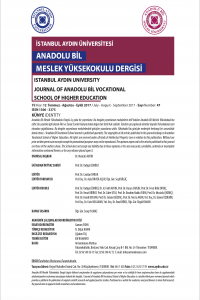Sınav yoluyla öğrenme: sınavların ikinci dil öğrenimine katkısı var mıdır?
Bu araştırmada, “Sınavların ikinci dil öğrenimine katkısı var mıdır?” hipotezinden yola çıkılarak,
sınavlar aracılığıyla öğrenme olanağı analiz edilmiştir. Öğrencilerin geçmiş yıllardan gelen
bilgilerini hedef malzemeyi öğrenme yeteneğinden ayırt edebilmek amacıyla, araştırma alanı
olarak yeni kelime öğrenimi seçilmiştir. Araştırmada, iki farklı sınıftaki benzer eğitim geçmişine
sahip iki farklı grup öğrenci incelenmiştir. Deney grubundaki öğrenciler önce bir sınava tabi
tutulur ve ertesi gün sınav oldukları konuyu çalışırlar. Kontrol grubundaki öğrenciler ise önce
konuyu çalışırlar ve ertesi gün konu üzerine bir sınav olurlar. Araştırmanın son safhasında ise,
her iki gruptaki öğrenciler bir final sınavına tabi tutulur ve konudaki gelişmeleri puanlanır.
Klasik yaklaşımla önce konuyu çalışan ve ertesi gün konu üzerine sınav olan kontrol grubu, final
sınavında daha başarılı olarak konuyu daha iyi anladıklarını ispat etmişlerdir.
Ne var ki, daha sonraki analizlerde, araştırmanın tekrar gözden geçirilmesi ve araştırma
metodunun değiştirilmesi gerektiği kanaatine ulaşılmıştır. Yapılacak bu değişiklikler sayesinde,
öğrencilerin daha önce hiç görmedikleri kelimelerle sınav ortamında karşılaşmalarının, bu
kelimelere karşı meraklarını artırdığı ve o kelimelerle ilk kez derste karşılaşan öğrencilere göre
daha başarılı oldukları ortaya çıkacaktır. Dolayısıyla bu araştırma en doğru araştırma metodunu
belirleyebilmek için yapılan bir ön çalışma olarak görülmelidir.
Anahtar Kelimeler:
Ölçme değerlendirme, test, sınav, ikinci dil öğrenimi, ingilizce öğretimi
Learning through tests: does testing improve second language learning?
Taking the hypothesis “Does testing improve second language learning?” as a starting point, the
possibility of learning through tests is analysed in this research.
Vocabulary learning is used as the field of research in order to be able to distinguish students’
prior knowledge from the ability to learn the intended material. The experiments in the research
have been conducted to two groups in two different classes with similar backgrounds. The
experimental group took the test first and on the other day they studied the material. The control
group studied the material first and on the other day they took a test on the material. Later, both
of the groups took a final retention test and the improvement of the students’ knowledge of the
subject is tested. My hypothesis proved wrong in the first analyses. The control group who
studied the material first and took the exam later with the classical approach proved their better
understanding of the new subject by performing better in the final retention test.
However, in later analyses, it is realised that the research needs a revision and a change in the
research method. Through these changes it will be proved that dealing with the words that the
students have never met before in an examination environment raises their curiosity towards the
words. So, the role of this research should be seen as a preparatory work to be able to determine
the best research method.
Keywords:
testing, second language learning, English language teaching.,
___
- -
- ISSN: 1306-3375
- Başlangıç: 2006
- Yayıncı: İstanbul Aydın Üniversitesi
Sayıdaki Diğer Makaleler
Sınav yoluyla öğrenme: sınavların ikinci dil öğrenimine katkısı var mıdır?
Levrek balığının Türkiye ve Dünyada yeri, önemi ve pazar durumu
Yunus ALPARSLAN, Taçnur BAYGAR
Yazılı anlatım sözlü anlatımdaki çekimser tutumun üstesinden gelebilir mi?
İngilizce birinci seviye öğrencileri için dilbilgisi öğretiminde tümdengelim ve tümevarım yöntemleri
